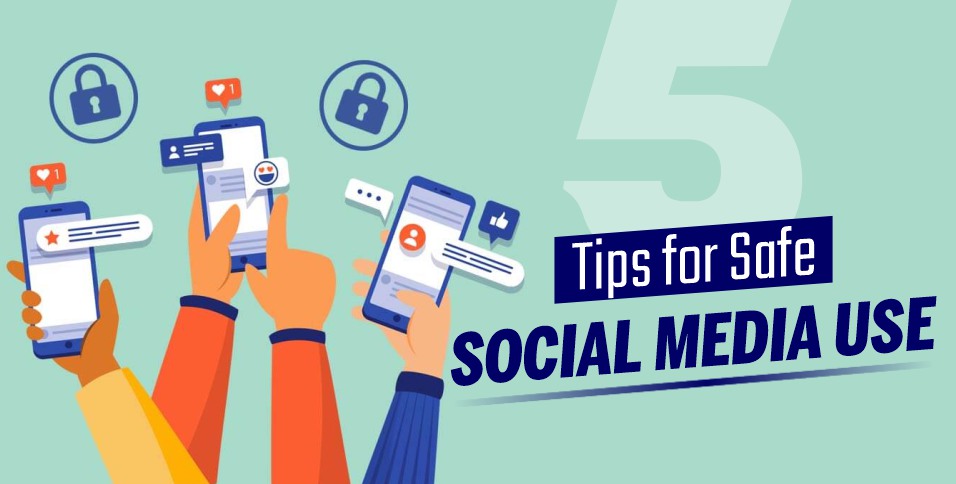There are a few basic rules to follow when using social media. These include using a strong password and limiting your audience. It also pays to think before you post anything. Usually, people use social media to be fun, but there are also some people who abuse it to hurt or offend others. So be considerate about who sees your posts, and consider setting your profile to friends and followers only. You should also accept the fact that what you post online will never be completely private.
Think of social media as a party. You wouldn’t just show up to any party without knowing who’s going to be there, what the vibe is, and what you’re going to do when you get there, would you? Of course not! And you shouldn’t show up on any social media site without knowing the same things. So in this post, we’re going to give you five tips for safely using social media sites.
Use Social Media Wisely
While social media sites and apps have loomed larger in our daily lives than traditional websites, the basic rules for safe internet usage remain the same. Hackers are still after your personal information, which can be used to access your bank accounts and credit cards. Moreover, careless internet browsing can put you at risk of identity theft or physical harm. Regardless of your age, you must make sure to follow these rules to keep yourself and others safe.
The first rule for safe social media use is to be respectful. This means that you shouldn’t use your account to solicit money or harass other users. Also, you should avoid posting any content that is hateful, threatening, or illegal. You should also be truthful and always correct your posts if they contain errors or mistakes.
Check Privacy Settings on Social Platforms
It is very important to check the privacy settings on social media platforms to make sure that your information is not publicly visible. Most social media platforms have default settings that allow third parties to access your personal information. To ensure that your information remains private, adjust the privacy settings on all your accounts. In addition, some social media platforms require biographical information, such as your full name, date of birth, age, and location, which cybercriminals can use to harm you.
Most social media platforms have FAQs and tutorials for setting up privacy. You can consult these websites or civil society groups to learn more about your privacy settings. In addition, you can also opt-out of interest-based advertising. For example, the Digital Advertising Alliance of Canada (DAAC) and Google offer a consumer opt-out tool that can help you decide what information you want to share online.
Limit Your Friends and Followers on Social Media
When using social media, it is important to limit your audience. This means that you should only accept friend and follower requests from people you know and trust in real life. If you don’t know the person who has sent you a request, don’t accept it. Also, be careful about what information you share with your friends and followers. Remember that they can share your information with other people, so only share what you are comfortable with.
In addition, you should also be aware of the fact that social media platforms can collect information about you and your friends. For example, Facebook uses the information it collects to target ads and sell products. If you are not comfortable with this, you can limit the amount of information you share on social media.
This can prevent you from appearing on a free people search and being found by anyone you don’t want to find.
Use a Strong Password
Creating a strong password is one way to protect your online accounts from hackers. It should be unique, long, and complex. In addition, it should be difficult to guess. There are five ways to test if your password is strong. Make sure it is at least ten characters long.
You can use a password manager to keep all your passwords in one place. It is important to use a strong password, especially if you use different social media accounts. Passwords should be long and unique and should contain a combination of lowercase letters and uppercase letters, as well as numbers and symbols. Also, avoid using common words and personal information.
Another way to protect your accounts is to use different passwords on each account. This will help prevent someone from using the same password for multiple accounts. Using a password manager can also help you remember your passwords.
Avoiding Sharing Personal Information
Sharing personal information online is a huge risk to your privacy. Your name, address, family members’ names, car information, passwords, birth date, and work history can be easily accessed by strangers. If you feel that you can’t avoid sharing your personal information, remove your name and other sensitive information from social media profiles.
Sharing personal information online can lead to pranks or identity theft. Therefore, it is wise to share only publicly relevant content. It will also increase the number of engagements for your posts. However, personal information, including photos and documents, should never be public. Even “fun quizzes” that ask you to reveal personal information are generally just social media pranks.
Conclusion
Social media can be a great way to stay connected with friends and family, but it is important to be aware of the risks. Be sure to limit your audience, use strong passwords, and avoid sharing personal information. Taking these precautions can help keep your accounts safe from hackers and data leaks.
















